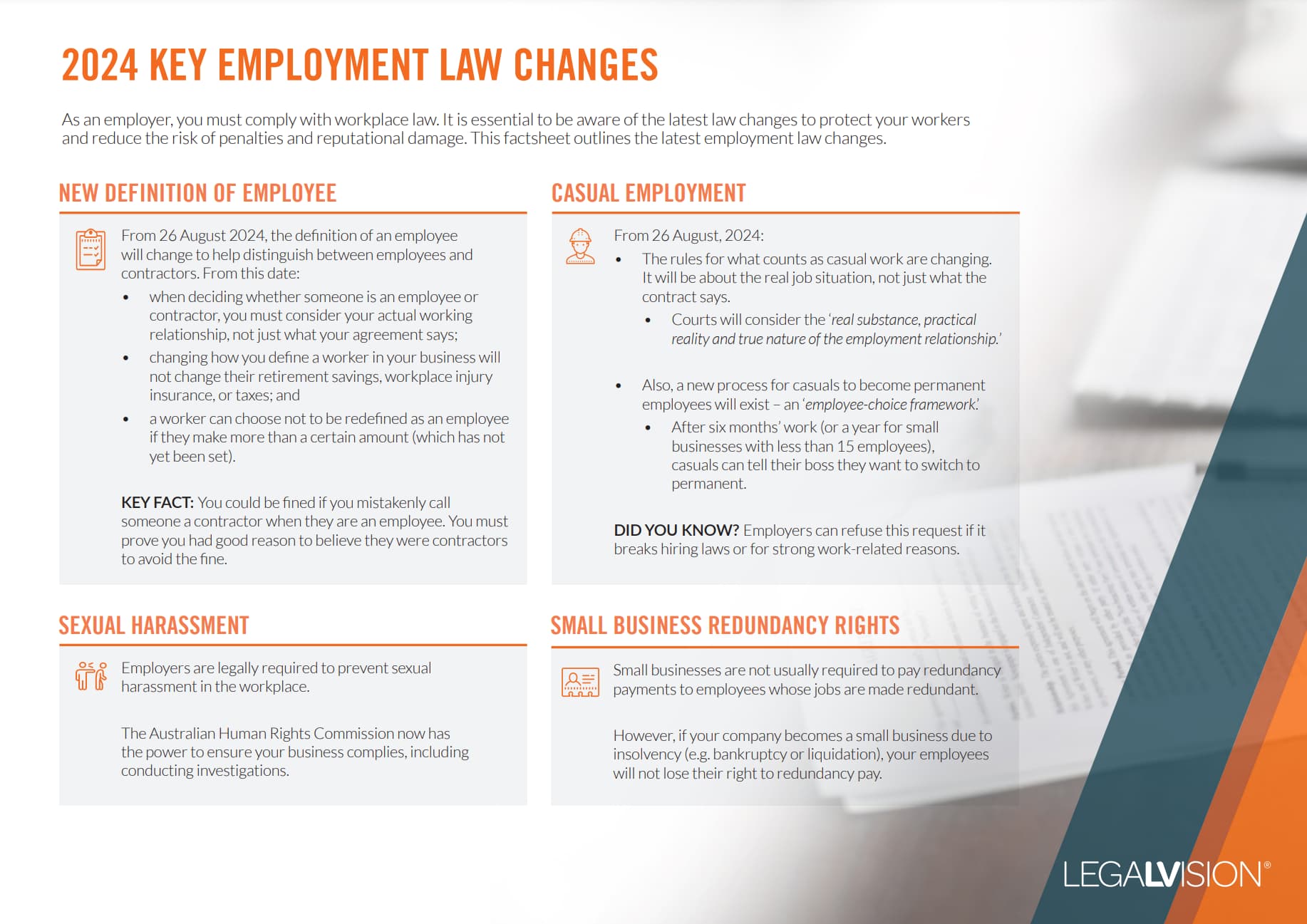As an employer, you might go through periods where there is simply no work for your staff to perform. These periods may arise for a variety of reasons, including:
- a blackout,
- severe weather,
- business closure because of an enforceable government direction; or
- a machinery breakdown.
Where you cannot usefully employ staff, you may be able to ‘stand them down’ and send the employees home without pay. However, you should ensure that you are doing this legally. This article will explain when you can send employees home due to circumstances beyond your control.
When Can You Stand Down Employees?
According to the Fair Work Act, there are three situations where you can stand down an employee without pay if you cannot usefully employ them. These are if there is a:
- strike or other industrial action (not including any you have caused);
- breakdown of machinery or equipment that you did not cause; and
- stoppage in work activities outside your control (e.g. due to a flood, loss of power, or natural disaster).
Following the COVID-19 pandemic, employers could stand down employees without pay when their business had closed because of an enforceable government direction, and there was for them to usefully employ the employee, even remotely.
However, you cannot stand down an employee under the Fair Work Act if:
- an enterprise agreement or employment contract applies to the employee; and
- the agreement allows the employer to stand down the employee if they cannot usefully employ them because of industrial action, machinery breakdown, or stoppage of work outside of your control.
The enterprise agreement or employment contract is your first point of call if you need to stand down an employee. These agreements might have specific conditions attached to stand-downs. For example, employment agreements may include clauses relating to mandatory notice periods or consultation processes. If so, you must adhere to these clauses before sending an employee home without pay.
A slow work period is not a valid reason to stand down your employees. For example, many businesses have a reduced workload over the Christmas period. You can’t stand down your employees during these slow periods. But you may choose to have a shut-down period where you direct staff to take annual leave. You still need to pay your staff for the annual leave they have accrued during the shut-down period.
What Is ‘Useful Employment’?
A strike or another event that disrupts the workplace occurring does not mean that you can automatically stand down employees without pay.
The fundamental principles in determining whether or not an employee can be usefully employed are if:
- they can undertake work activities that are within the terms of their employment contract, even if they do not normally complete that kind of work; and
- there is work for some but not all of the employees, you cannot validly stand down the entire workforce.

As an employer, it is essential to understand what employment laws have changed and their implications for your business — particularly the changes to the Fair Work Act 2009 through the new Closing the Loopholes legislation.
Do I Owe My Employees Payments?
You do not have to pay your employees during a stand down period. However, standing down employees can have an extremely detrimental impact on your employees as they are essentially losing their income for the stand down period. It is important to consider whether you are complying with your obligations as an employer before your stand down employees. If you are not legally entitled to stand down your employees, you may be liable to back pay them what they would have earned had they been working during the stand down period. You may also face liability regarding any possible penalties.
If your employees have accrued leave entitlements such as paid annual leave they may request to access this leave during the stand down period.
What If I Do Not Have Enough Work For My Employees Anymore?
You may have other options if you no longer require your employees due to operational changes in your business i.e. due to a downturn in business. In this situation, you may consider making your employees redundant.
It is important that you ensure you comply with any consultation requirements before making your employees redundant, this includes considering any possible alternative options to the redundancy. You should also ensure that the redundancy is considered a ‘genuine redundancy’ to mitigate the risk of an unfair dismissal claim. As such, you should seek legal advice before commencing any redundancy process.
In certain circumstances, your permanent employees may be entitled to receive redundancy pay such as:
- if you have employed them for at least 12 months; and
- you have 15 or more employees across your business or any of its associated entities.
You do not owe casual employees redundancy pay.
How much redundancy pay your employee is entitled will also depend on how many years they have been employed by your business. An employee’s entitlement to redundancy pay progressively increases based on how long you have employed them at your business. You may also need to consider whether your employees are covered by an applicable modern award that sets out an industry-specific redundancy scheme, such as the Building and Construction General On-Site Award 2020.
Key Takeaways
You can stand down employees without pay where you cannot put the employees to use within the business. The most common situations giving rise to a stand-down include:
- strikes;
- equipment failures;
- enforceable government directions causing business closures and
- a natural disaster or blackout.
If you need to stand down your employees for one of these reasons, it is important to ensure that you are not breaching any employment obligations. If you have any questions about standing down employees, our experienced employment lawyers can assist as part of our LegalVision membership. For a low monthly fee, you will have unlimited access to lawyers to answer your questions and draft and review your documents. Call us today on 1300 544 755 or visit our membership page.
We appreciate your feedback – your submission has been successfully received.











